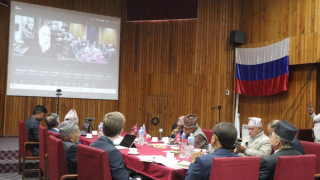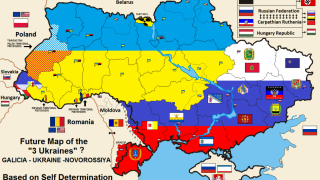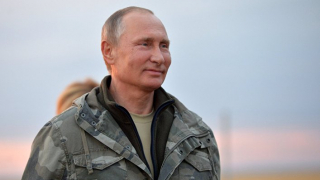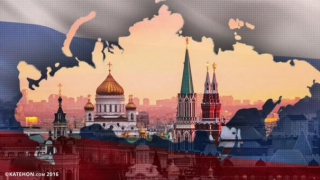Hungary – How the Formerly Eurasianist Jobbik Became a Russophobic Party
Besides its Prime Minister, Viktor Orbán, who has become world-famous since his reelection in 2010, Hungary’s political scene has featured one other major attraction in recent years: the formerly radical Right-wing nationalist party, Jobbik. Given that Jobbik has made an enormous political (and geopolitical) U-turn over the past few years, readers outside Hungary should know more about these changes.
The rise of a radical party during a troubled period (2003-2010)
During the late 1990s and early 2000s, Hungary’s Right wing and nationalists in general were quite hostile to Russia as a result of the legacy of anti-Communism and the Soviet Union’s half-century occupation of the country.
After the surprising victory of the liberal Hungarian Socialist Party (MSZP) in 2002, Viktor Orbán’s Fidesz party (which first governed the country between 1998 and 2002) returned to the opposition, while the nationalist Hungarian Justice and Life Party (MIÉP) didn’t win even a single seat in Parliament in that election (they dropped to 4.37%; there is a 5% threshold to get into Parliament).
This climate favored the emergence of a new, youthful nationalist party, Jobbik, which was founded in 2003. In the April 2006 national election, the MSZP and its Prime Minister, Ferenc Gyurcsány, won reelection, while Jobbik achieved only marginal results. However, Jobbik gained a huge boost during the events of the autumn of 2006, when Gyurcsány’s lies about the country’s economic situation were revealed in the mainstream media. Despite the scandal and the subsequent riots, which shook Budapest for weeks, Gyurcsány’s government was never in serious danger. For one thing, there was no international support for his removal, as there had been two years earlier in Ukraine’s “Orange Revolution.”

Wikimedia Commons
Nevertheless, after this incident it was clear that Fidesz had a good chance of winning the 2010 election, while Jobbik was also on the rise and was well-positioned to enter the next Parliament. Jobbik became a very radical nationalist party, even forming a militia, the Magyar Garda (Hungarian Guard), which became quite (in)famous around the world.
From that time, Jobbik adopted an international policy which was quite open and favorable toward Russia, which was unprecedented at that time. Many observers linked this orientation to Béla Kovács, a Russian-speaking businessman who took charge of the party’s foreign relations in the mid-2000s. Jobbik was also strongly Euroskeptic, pro-Iranian, and anti-Zionist during this period.
Turanism, Eurasianism: Turn to the East!
After entering Parliament in 2010 with 17% of the votes (Fidesz, for its part, received a two-thirds parliamentary supermajority, which it still enjoys today), Jobbik continued to promote an innovative and unusual geopolitical vision. This vision was put forward by Jobbik’s youthful Chairman, Gábor Vona.
The basic idea underlying Vona’s geopolitical point of view was that history and geography placed Hungary in the middle of a triangle of three major powers which have always had a strong influence on Hungary’s fate: Germany, Turkey, and Russia. Vona never expected much from today’s Germany, and looked instead to develop relations with Turkey and Russia, which he described as key countries of Eurasia.
During this period, Vona was very actively promoting the theory of Turanism in Hungary. According to the conception of it which he endorsed, the Finno-Ugric linguistic theory which posits a link between the Hungarian and Finnish languages is wrong. Rather, it holds, Hungarian roots are to be found somewhere else, and are linked to the Huns of Attila. Turanism also advocates for strong ethnic links between Hungarians and other Turkic peoples, such as the Turks and Uighurs.
Vona travelled frequently to Turkey, where he delivered many speeches calling for cooperation between Hungary and Turkey. In 2013, he declared that he was in favor of leaving the EU and developing closer ties with Turkey. He also made statements about Islam which were not always welcomed by other Hungarian nationalists, once referring to Islam as a “ray of light” for humanity amidst the secular, liberal, and materialistic gloom of globalism.

Wikimedia Commons
At the same time, Vona was also visiting Russia, and gave a lecture at the Lomonosov University in Moscow alongside Alexander Dugin. In June 2014, he openly declared himself to be a Eurasianist. Events in Ukraine that year also offered Jobbik an opportunity to show where they stood geopolitically, with Jobbik representatives participating in the referenda in Crimea and Donbas as election observers. One of these in Crimea in March 2014 was Jobbik MEP Béla Kovács. A few weeks later, Mr. Kovács was charged with being a Russian spy, which led to his gradual withdrawal from Jobbik’s international relations team as well as politics more generally (he left politics altogether this year when his term in the European Parliament ended in 2019).
Over the years, Jobbik’s foreign relations were led by MP Márton Gyöngyösi. Gyöngyösi declared during Crimea’s reunification with Russia that Soviet domination of Hungary had been less cruel than domination by the EU and the Atlanticists, since during Communism the nation’s capital had at least remained under national control, while today none of the nation’s wealth and capital remains in Hungarian hands. Moreover, Gyöngyösi was present in Donbass during the November 2014 elections there.
2015 earthquakes in Hungarian politics
In 2014, Fidesz again won a huge victory in the parliamentary elections, with Jobbik receiving 20% of the votes. These results were similar to those of 2010. But the following year, major changes began to occur in Hungarian politics:
• In February 2015, there was a major clash between Orbán and the oligarch Lajos Simicska. Orbán and Simicska had been friends since the 1980s, during the struggle against the Communist regime. In 2015, Simicska was the owner of many of the country’s television stations, radio stations, and newspapers. The reasons for this break remain unknown, but among the few explanations Simicska has offered, he claimed that he believed Orbán was building an authoritarian regime and was too close to the Russians.
From 2015 onwards, Simicska openly supported Jobbik, offering them more and better visibility in his various media outlets and purchasing advertising space for them on billboards and kiosks across the country, which was easy considering that Simicska’s companies controlled thousands of the advertising spaces.

• After Hungary found itself on the front lines of the migrant crisis (more than 400,000 illegal migrants crossed the country at that time), Orbán became the first European leader to build a fence in an attempt to stem the flow, which made him a hero among many Right-wingers (including Jobbik supporters) in Hungary and across Europe.
• From 2015 (in fact from 2013, when Jobbik began to attempt to present a less radical image of itself while leaving its political program unchanged), Jobbik began to move to the center and began very brutally attacking Orbán in every possible matter. Enormous billboard campaigns were mounted promoting the idea that the Fidesz government is corrupt. These campaigns strongly resembled similar campaigns that had been organized in other post-Communist countries in order to destabilize governments.

A geopolitical U-turn
This shift to the center resulted in significant changes to Jobbik’s party program between 2016 and 2018. They reversed their position on Gay Pride in Budapest; having once called for its banning, they now argued that since Orbán’s regime is authoritarian, it is not good to impose additional restrictions on society. They criticized the government’s stance in opposing George Soros’ Central European University, which is based in Budapest. They also declared that they were no longer in favor of leaving the European Union.
Step by step, it became clearer that the once radical nationalist party Jobbik was now prepared to attempt to defeat Orbán at any price, including by joining a Left-liberal/Atlanticist coalition. And in terms of international policy, in addition to abandoning Euroskepticism, other changes began to gradually take shape.
While flip-flopping from being an anti-EU to a pro-EU party, Jobbik started to distance itself from Russia, and its discussion of Turkey and Turanism ceased as well.
Once Jobbik declared that Hungary belongs in the EU, Gyöngyösi also said that there is no alternative but for Hungary to continue its NATO membership.
While Orbán became a major figure and a model for many European conservatives and nationalists, Jobbik seemed to be fed up with it. In an interview with the French Courrier d’Europe centrale magazine in March 2018, Gyöngyösi declared that Orbán had become a danger to democracy, adding that “wherever you go, nationalists, extremists, and Russophiles in Europe see Orbán as a model.”
During the run-up to the 2018 election, Jobbik declared that it was certain of its victory, and Gábor Vona said that he would resign in the event that they were unsuccessful. In the end, Fidesz won another huge victory, while Jobbik remained at around 19% of the vote. Vona indeed resigned as Chairman and was replaced by Tamás Sneider, a former skinhead leader who agreed with Vona’s strategy of changing Jobbik’s platform in order to defeat Orbán at all costs.
The Russophobic Ukrainian political commentator Anton Shekhovtsov welcomed Sneider’s accession:

After its defeat in 2018, Jobbik faced an internal split between supporters of its original line and those who supported its new direction. As a result, it has become a more marginal force in Hungarian politics. When Jobbik Vice President László Toroczkai failed to defeat Sneider in his bid to become Chairman, he was forced out of the party and created his own, Mi Hazánk, which has been seeking to fill the radical nationalist void that was created by Jobbik’s shift. In the May 2019 European parliamentary elections, Jobbik dropped to 6.34% of the vote, while Mi Hazánk got 3.29%, despite being less than a year old.
What remains of Jobbik is now forming an alliance with the Left-liberal parties to contest Hungary’s local elections that will be held on October 13.
Jobbik today is a strongly anti-Russian party. In January 2019, Gyöngyösi pretended that Jobbik’s Russia policy hasn’t changed, claiming that this perception is simply a result of the government’s actions – which suggests that Gyöngyösi isn’t always comfortable with the changes that he himself has helped to introduce.
In February 2019, Jobbik sent a representative (Balázs Szabó – he’s not an MP, as some sources have incorrectly stated) to an Intermarium conference in Estonia, in which representatives from Ukraine’s radically anti-Russian Azov National Corps also took part.

In July 2019, the Daily News Hungary Website – which is financed by Jobbik – has been spreading fake news which claims that Hungary helped to facilitate Russia in transporting arms across its territory into Serbia. The article “forgot” to mention that the Russian aircraft also crossed Poland, for example.
In August 2019, Jobbik’s new prominent personality, Péter Jakab (who has a good chance of becoming Jobbik’s leader by the end of 2019), declared that “if Orbán remains in power for 15 more years, Hungary will no longer be a member of the EU but will become a Russian colony.”
Given the instability at its core, it is now uncertain if Jobbik will survive the coming years. From a Eurasianist perspective, it no longer holds a great deal of importance anyway, since the party is now fully aligned with the Left-liberal forces that are seeking to overthrow illiberal conservative Viktor Orbán. But Jobbik’s fate is a perfect example of how those who present themselves as radicals one day can transform themselves into good liberals the next, in this age of ideological plasticity that holds sway in postmodern Europe today.














